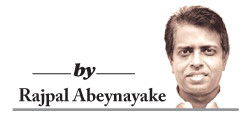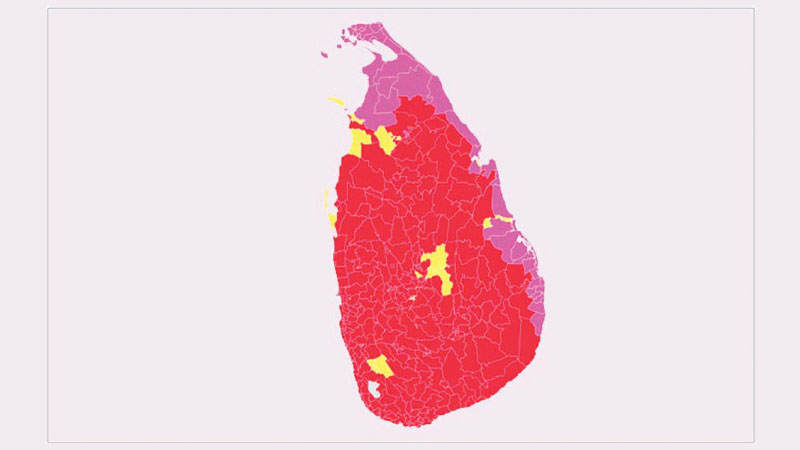 The post Local Government (LG) election discourse is replete with conversations about how certain mainstream Opposition parties so-called, performed at the polls. None of these Opposition forces gained anything significant in the LG polls held after the general elections where they faced a rout.
The post Local Government (LG) election discourse is replete with conversations about how certain mainstream Opposition parties so-called, performed at the polls. None of these Opposition forces gained anything significant in the LG polls held after the general elections where they faced a rout.
That hasn’t stopped persons such as Thalatha Athukorale (UNP) from claiming that the Government has lost its mandate and should now ‘go home.’ (A direct quote, that.) This is rich, coming from a politician representing a party that has woefully underperformed. But also this statement is so ridiculously false that perhaps Athukorale should consider giving up politics, issuing an apology, and resigning to a quiet life at home herself.
The National People’s Power (NPP) mandate is reaffirmed by the fact that the governing party secured an absolute majority in close to 50 percent of the Councils polled, while they came substantially ahead in number of membership slots secured in the rest of the LG bodies.
It is in some Councils in the Northern province and some other ethnically mixed areas that the NPP was not in the lead. The fact that there is a certain reduction in the number of votes secured, and the number of votes secured by the NPP as a percentage, is partly perhaps due to the nature of the election. It was a Local Government electoral contest, in which many Independent candidates, prominent in the local areas, secured a substantial slice of the vote.
However, in key contests, such as for the Colombo Municipal Council (CMC), the NPP being in the lead is apparently being challenged by the SJB in cahoots with some of the other parties that, we are told, want to set up the administration while securing the Mayoralty.
ROAD BLOCKS
To put it in short, this is a rather anti-democratic power grab that’s being attempted. The NPP has secured a lead of over 19 members in the CMC and should by virtue of the fact that it is the party that leads by far, secure the Mayoralty and set up the administration.
It is the convention in democratic elections that in hung outcomes where no party secures an outright majority in any election, that the party that is comfortably in the lead gets the first chance to govern.
It is why the Head of State — say the King or Queen of England — almost always asks the party which has won the most number of seats at the election to form the Government.
In Australia, the Governor General acts on the advice of the caretaker Prime Minister of the country, in extending an invitation to the party that can command a majority in Parliament to form a Government. There is currently a hung Parliament in India after both the BJP and the INC failed to secure majorities in parliamentary elections in 2024. However, the BJP which has a very comfortable lead, was able to form a very stable Government with the support of some regionally based political parties, and this administration has been in power for over a year now without encountering any roadblocks.
It is in this context it is clear that though there is nothing to say that the party that is not in the lead cannot form a Government, that the party that leads substantially, always gets the first chance to govern. The same applies for administrations in Local Councils.
This is so for both practical and moral reasons. It is, therefore, rather disconcerting to hear at the time of writing that the Opposition SJB hopes it would form the administration in the CMC.
If it could in fact manage that feat, the SJB should do so only by showing a clear majority, and not by bragging about being able to form the administration. In the first place, the SJB cannot in any way claim a sterling performance in Colombo, with its Mayoral candidate being defeated by a 19-year-old in his ward in Borella South.
For a party that came up with such a poor showing, the idle boast of grabbing the Mayoralty in Colombo without showing an actual substantial majority in the Council, is not a good look, to resort to the colloquialism. The argument being made by the Opposition is that, of course, technically anyone who can show a majority can form the administration in a Council.
But, it behooves the SJB to concede the first shot at governing the CMC to the NPP, because the latter has a substantial lead in number of seats secured, even though an outright majority eluded them.
The same applies for the SJB and other parties in scores of other Councils where the NPP leads. The SJB can speak in terms of establishing the administration in any number of LG bodies if the party along with other parties came close to the leader, the NPP, in the LG bodies in which no outright majority by one party can be seen.
power equation
But overall, the SJB, or any of the parties concerned, did not make any substantial dent at all in the power equation that prevails in the country. Where the NPP did not gain an absolute majority, the other parties still lost and trailed behind markedly, in almost all of the other LG bodies save for the North, and other ethnically mixed areas.
The failure of the SJB, SLPP, UNP and others to acknowledge that reality is rather reflective of the inability of the Opposition to accept its collective failure and attempt to rebuild with a view towards its own future viability.
But the political reality on the ground would soon assert itself. The same situation obtained — though obviously in vastly different circumstances — in the aftermath of the last general election in India. The Congress Party leader Rahul Gandhi began speaking in the Lok Sabha soon after the announcement of results as if the Congress had won, even though the party was trailing far behind, and had only succeeded in depriving the BJP of the outright majority it had enjoyed before.
But despite this gung-ho attitude, the Congress leadership was unable to secure the support of any of the smaller parties that would have enabled them to come at least close to securing a majority in the Lok Sabha, giving them a shot at forming the Government.
Prime Minister Modi chided Mr. Gandhi in the House, saying that the student that had got 99 marks is rejoicing, until the teacher tells him he only got 99 out of 530, not 99 out of 100. Mr. Modi with this snide remark made it clear that Gandhi’s Congress performed rather badly, and indeed, the BJP was able to secure the support of the smaller parties and govern. Today, the BJP-led Government is so stable that it is ruling uninterrupted, and substantially unchallenged.
STAGES
The parties of the Opposition in this country are bound to similarly reconcile with the reality that they lost, and that the governing party is mandated to govern not just the country as a whole but the Local Government bodies as well.
As for the North and the Jaffna peninsula, the fact that the local bodies chose candidates from their local areas is to be expected. This is after all, Local Government. The North is mostly a territory in which a war was fought for self-determination. Today, there is no such armed campaign, but the people of that region are entitled to choose from their own when it comes to the most rudimentary forms of governance at least i.e: governance at the local level.
Nobody can or should dispute that right. This LG election outcome in ethnically mixed areas is quite natural, and would be treated as such by all parties as it is best that it is acknowledged that local governance is left to locally based parties in certain areas of the country, that are culturally different from majority Sinhala-speaking areas.
But coming back to the general outcome islandwide, it has to be said that the Opposition is merely going through its various stages of grief. Notoriously, one of the five stages of grief is denial. Though it’s possible that incumbency reduced the likelihood of a rout by the NPP as in the general elections, the fact remains that the Opposition performance is not one that it can be collectively happy about.
It would be remembered that in 2018, the then Opposition in fact, won the LG elections by a landslide. This Opposition has, in contrast, lost and lost rather badly considering that its constituent parties — save for the Tamil parties — have not been able to lead in any geographical region of the country in which they contested and were ostensibly credible contenders. The Opposition would probably realise the extent of its loss after going through the rest of its incremental stages of grief.






